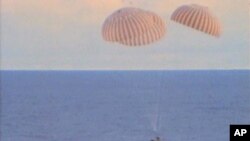In April 1970, Apollo 13 was scheduled to land on the moon in NASA's bid to further explore the lunar surface. Instead, an in-flight explosion rocked the spacecraft, preventing astronauts Jim Lovell, Jack Swigert, and Fred Haise from landing on the moon.
Their weeklong ordeal in space captivated the world. Now, NASA and the Adler Planetarium in Chicago are celebrating what many call the "successful failure."
By April 1970, man had already landed on the moon and the public's interest in the space program began to wane.
The Apollo 13 mission was slated to be the third lunar landing. But many news organizations initially overlooked it.
"The enthusiasm for lunar flights had diminished greatly," explained Lovell.
When Jim Lovell took command of Apollo 13, with astronauts Fred Haise and Jack Swigert, he was about to realize his dream to land on the moon.
But the dream faded two days into the mission. An explosion crippled the spacecraft soon after the crew wrapped up a lengthy live television broadcast.
"After that explosion, of course everyone was riveted as to what's going to happen," he added. "Can we get these guys back?"
With the world watching, flight controllers at NASA and the astronauts frantically worked to find a way to get them safely back to Earth.
For five days, through one crisis after another, the Apollo 13 crew and mission specialists on the ground worked through each difficulty. The astronauts survived by rationing water and food while using the lunar lander as a lifeboat before returning to the command module for re-entry to Earth.
Their efforts ended with splashdown in the Pacific Ocean. All three astronauts survived, and Apollo 13 became known as a "successful failure."
"It was a failure with regards to its initial mission, a success to the triumph of the people that suddenly were thrust upon a problem that they never anticipated, they never planned for, they never trained for, and were able to pull off successfully a successful recovery," said Lovell.
The ordeal was the basis of the 1995 movie Apollo 13. Tom Hanks starred as Jim Lovell.
Lovell never returned to space or landed on the moon, yet the movie made him a household name.
"I think it regenerated a whole new generation of young Americans about the space program," he said.
For the 40th anniversary of Apollo 13, events are planned at the Adler Planetarium near Lovell's home in Chicago, and at NASA's Kennedy Space Center in Florida. Lovell will join fellow astronaut Fred Haise to mark the occasion. Jack Swigert died in 1982.
"I look at the 40th anniversary of Apollo 13 as the last anniversary of Apollo 13. The last anniversary probably of Apollo flights. I think we have to go forward now," Lovell noted.
But NASA's Space Shuttle program is scheduled to end in September, a move Lovell opposes because he says the United States will not be able to support the International Space Station.
Lovell says NASA currently lacks goals for the space program. He favors a project to send people to Mars, but he also wants to see American astronauts return to the one place he never reached, the surface of the moon.













